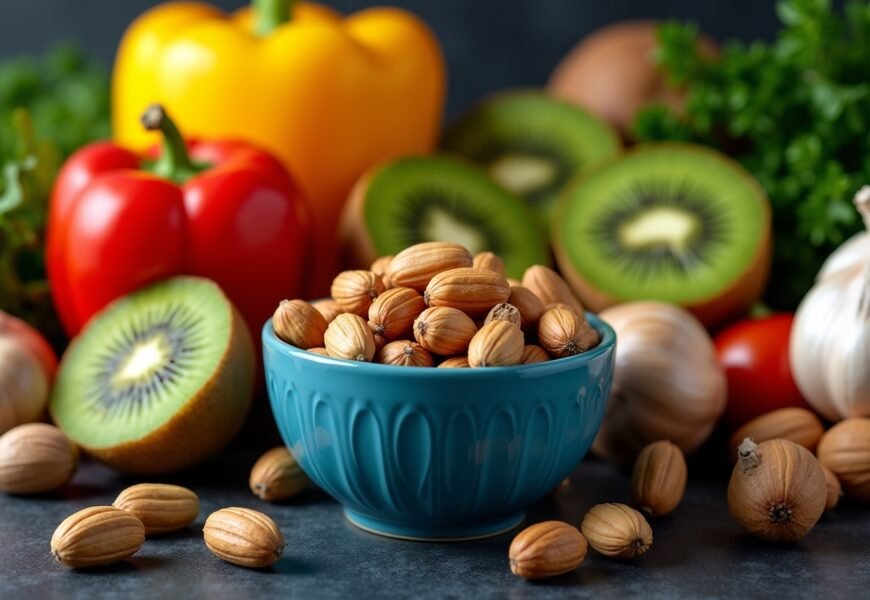More than 70% of Americans have purchased organic foods at least once, drawn by their promise of health and sustainability. Perhaps you’ve wandered through a bustling farmer’s market, captivated by colorful produce, and wondered how organic options could enrich your life. The growing popularity of organic foods stems from their impressive benefits: improved well-being, eco-friendly practices, and exceptional flavor. With countless choices lining store shelves, identifying the most intriguing types of organic foods can elevate your meals and nourish your body. Let’s dive into ten standout varieties you should know about.
What Makes Organic Foods Special?
As organic food consumption rises, understanding their unique qualities becomes key. Grown without synthetic pesticides or fertilizers, organic foods prioritize your health and the planet’s future. Yet, the sheer variety—from crisp fruits to hearty grains—can feel daunting. To guide you, we’ve curated a list of ten fascinating organic food types that deserve a spot in your kitchen.
1. Organic Fruits: Nature’s Sweet Reward
Organic fruits deliver unmatched taste and nutrition. Take a bite of an organic strawberry, and you’ll notice its vibrant flavor, free from chemical residues. Apples, bananas, and berries, rich in antioxidants, turn snacking into a wholesome delight. Seek out seasonal organic fruits at local markets for peak freshness and taste.
2. Organic Vegetables: Packed with Vitality
Beyond avoiding pesticides, organic vegetables offer a nutrient-rich foundation for any diet. Leafy greens like kale and spinach overflow with vitamins, minerals, and fiber. Growing your own organic veggies, whether in a garden or on a windowsill, fosters family bonding and ensures the freshest harvest possible.
3. Organic Dairy: Pure and Ethical
Opting for organic dairy supports humane farming practices. Milk, cheese, and yogurt from cows raised without hormones or antibiotics deliver clean taste and essential nutrients like calcium. Brands committed to sustainability offer delicious, family-friendly options you can trust.
4. Organic Grains: A Wholesome Base
Organic grains like quinoa, brown rice, and oats provide a nutrient-dense alternative to refined varieties. They help stabilize blood sugar and support digestion. Swap white rice for organic brown rice or kickstart your day with organic oats for a heart-healthy boost.
5. Organic Legumes: Protein-Rich Versatility
Organic legumes, such as lentils, chickpeas, and black beans, pack a powerful protein punch. Ideal for meatless meals, they’re budget-friendly and eco-conscious. Add them to soups, salads, or sides to unlock their hearty flavor and nutrition.
6. Organic Nuts and Seeds: Small Yet Mighty
Organic nuts and seeds, including almonds, walnuts, chia, and flaxseeds, bring healthy fats, protein, and fiber to your table. Toss them into salads, blend them into smoothies, or enjoy them solo for a satisfying, nutrient-packed snack.
7. Organic Herbs: Fresh Flavor Boosters
Organic herbs like basil, parsley, and cilantro elevate dishes without synthetic additives. Bursting with vitamins and minerals, they transform meals with vibrant taste. Cultivate your own herb garden for a steady supply of freshness.
8. Organic Seafood: Sustainable and Nutritious
Organic principles extend to seafood with wild-caught or responsibly farmed options. Salmon, sardines, and shrimp offer omega-3 fatty acids vital for heart health. Verify certifications to ensure sustainability and quality with every bite.
9. Organic Snacks: Guilt-Free Treats
Organic snacks, from popcorn to fruit bars, provide wholesome alternatives to processed options. With fewer additives and sugars, they satisfy cravings healthfully. Involve kids in choosing them to nurture lifelong healthy habits.
10. Organic Beverages: Clean and Conscious
Organic teas and coffees deliver pure flavor without pesticide traces. Specialty brands embracing sustainable practices enhance your sipping experience. Start your morning with organic coffee, knowing it benefits both you and the environment.
How to Embrace Organic Foods Daily
With these ten types of organic foods in mind, integrating them into your routine is simpler than you might think. Here are practical strategies to get started.
Shop Local and Seasonal
Farmers’ markets offer fresh, seasonal organic produce that often costs less than imported goods. You’ll enjoy better taste while supporting local growers and cutting your environmental impact.
Stay Organized with Apps
Use apps like Yummly or Lose It! to plan recipes and track seasonal organic buys. Staying organized simplifies your shift to a cleaner, greener diet.
Prep Meals Ahead
Plan and prepare meals in advance to ease weekday stress. Stock your fridge with organic ingredients for quick, nutritious dishes like a hearty organic legume soup.
Try New Recipes
Organic foods inspire culinary creativity. Experiment with recipes like an organic herb-infused sauce or a legume casserole to uncover new favorites.
Learn the Benefits
Deepen your commitment by exploring organic food advantages through books, documentaries, or blogs. Knowledge empowers smarter, healthier choices.
Real Stories of Organic Living
Meet people who’ve transformed their lives with organic foods, proving their impact in relatable ways.
Emily, a California mom, switched to organic fruits and veggies after noticing her kids’ reactions to processed foods. Cooking together became a family ritual, sparking their love for healthy meals.
Jack, a 45-year-old tech worker, overhauled his diet with organic whole foods to combat fatigue. Shopping at a co-op, he regained energy and rediscovered his passion for cooking.
The Wilson family turned their yard into an organic garden, growing veggies and herbs. This hands-on experience strengthened their bond and trimmed grocery costs.
Navigating Organic Challenges
Switching to organic foods has its hurdles, but solutions exist to keep you on track.
Cost Concerns: Organic items may seem pricey, but bulk buys, farmers’ market deals, or CSA memberships can lower expenses.
Label Confusion: Learn to spot the USDA organic seal for assurance. Ask vendors about sourcing if you’re unsure.
Limited Access: Explore online organic delivery or local co-ops if options are scarce near you.
A Healthier Path Forward
Organic foods offer more than nutrition; they connect you to a sustainable, flavorful way of living. From the juicy burst of organic fruits to the earthy goodness of legumes, these choices enrich your plate and your life. Starting this journey takes effort, but each step brings rewards for your health, family, and the planet. Embrace the adventure of organic eating, and savor the vibrant possibilities ahead!














